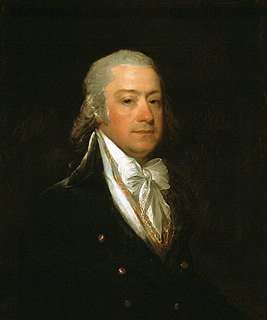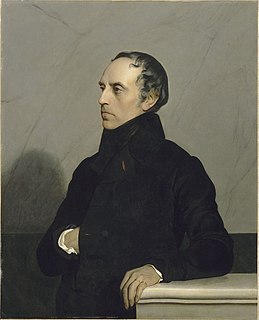A Quote by Alexis de Tocqueville
I am obliged to confess that I do not regard the abolition of slavery as a means of warding off the struggle of the two races in the Southern states. The Negroes may long remain slaves without complaining; but if they are once raised to the level of freemen, they will soon revolt at being deprived of almost all their civil rights; and as they cannot become the equals of the whites, they will speedily show themselves as enemies.
Quote Topics
Abolition
Abolition Of Slavery
Almost
Almost All
Am
Become
Being
Cannot
Civil
Civil Rights
Complaining
Confess
Deprived
Enemies
Equals
Level
Long
May
Means
Obliged
Off
Once
Races
Raised
Regard
Remain
Revolt
Rights
Show
Slavery
Soon
Southern
Southern States
States
Struggle
Themselves
Two
Whites
Will
Without
Related Quotes
The presence of the blacks is the greatest evil that threatens the United States. They increase, in the Gulf States, faster than do the whites. They cannot be kept for ever in slavery, since the tendencies of the modern world run strongly the other way. They cannot be absorbed into the white population, for the whites will not intermarry with them, not even in the North where they have been free for two generations. Once freed, they would be more dangerous than now, because they would not long submit to be debarred from political rights. A terrible struggle would ensue.
It is pleasing to reflect that results so beneficial, not only to the States immediately concerned, but to the harmony of the Union, will have been accomplished by measures equally advantageous to the Indians. What the native savages become when surrounded by a dense population and by mixing with the whites may be seen in the miserable remnants of a few Eastern tribes, deprived of political and civil rights, forbidden to make contracts, and subjected to guardians, dragging out a wretched existence, without excitement, without hope, and almost without thought.
A wise man will not leave the right to the mercy of chance, nor wish it to prevail through the power of the majority. There is but little virtue in the action of masses of men. When the majority shall at length vote for the abolition of slavery, it will be because they are indifferent to slavery, or because there is but little slavery left to be abolished by their vote. They will then be the only slaves. Only his vote can hasten the abolition of slavery who asserts his own freedom by his vote.
I can't say with certainty that slavery would have ended more quickly and more completely if the South had been allowed to leave and escaped former slaves had been allowed to remain free, and the North and the rest of the world had been a positive influence on the South. However, it's certainly a possibility that it would have ended sooner if the southern slave owners had agreed to a system of compensated emancipation and freed the slaves without a war and without secession, as most nations that ended slavery did. That absolutely would have been preferable to the Civil War as it happened.
The danger of the past was that men became slaves. The danger of the future is that men may become robots. True enough, robots do not rebel. But given man's nature, robots cannot live and remain sane, they become ''Golems',' they will destroy their world and themselves because they cannot stand any longer the boredom of a meaningless life.
Many Southern Plantation owners were working towards the day when they could convert their investment to more profitable industrial production as had been done in the North, and others felt that freemen who were paid wages would be more efficient than slaves who had no incentive to work. For the present, however, they were stuck with the system they inherited. They felt that a complete and sudden abolition of slavery with no transition period would destroy their economy and leave many of the former slaves to starve - all of which actually happened in due course.
When you expand the civil-rights struggle to the level of human rights, you can then take the case of the black man in this country before the nations in the UN. You can take it before the General Assembly. You can take Uncle Sam before a world court. But the only level you can do it on is the level of human rights. Civil rights keeps you under his restrictions, under his jurisdiction. Civil rights keeps you in his pocket.
The commerce of a free people is many times more valuable than that of slaves. Freemen produce and consume vastly more than slaves. They have therefore more to buy and more to sell. Hence the free states have a direct pecuniary interest in the civil freedom of all the other states. Commerce between free and slave states is not reciprocal or equal.







































